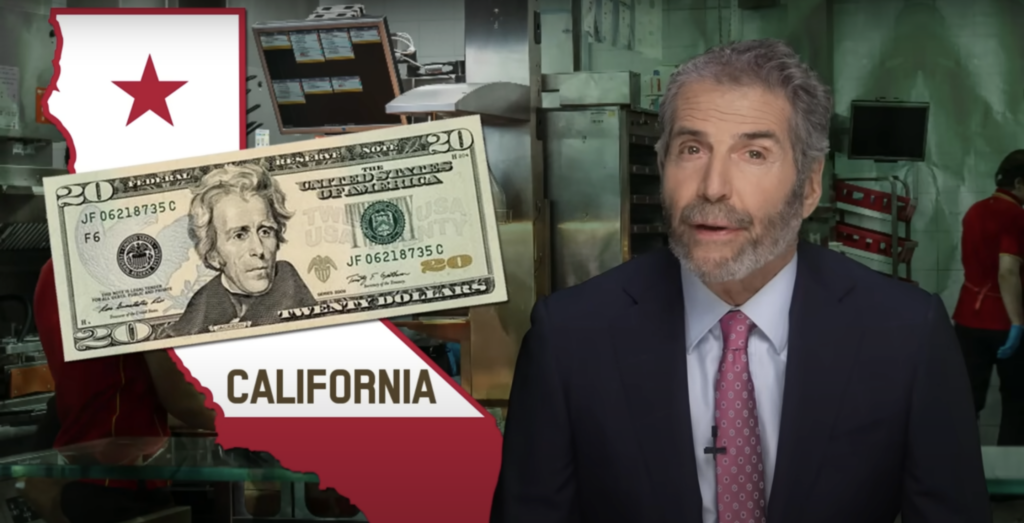California now leads the nation in enforcing stupid wage laws.
The state just raised the hourly minimum wage for fast food workers to $20.
Gov. Gavin Newsom said: “We see the inequity… and we have a responsibility to do more.”
Unions demand higher minimum wages, and in states run by Democrats, unions usually get what they want.
CNN announced, “500,000 fast food workers in California now make $20 an hour.”
Leftists at the Center for American Progress claim that “raising the minimum wage will lift millions of families out of poverty and further stimulate the economy.”
Yeppy! It’s a happy cycle! A win-win situation.
But wait, if this is a win-win, why only make the minimum $20? Why not $30? Or $100?
Because government demands for higher wages are not a win-win.
Interfering with market prices always has nasty unintended consequences.
Frederic Bastiat pointed out in his book “The Visible and the Invisible” that when government power affects economic decisions, there will always be visible and invisible consequences. “Almost always,” he wrote, “the immediate consequences are beneficial and the ultimate consequences fatal.”
In this case, the immediate consequence is that existing workers get a raise. great. This is what is seen. This is what the media, unions, and the Center for American Progress see. But the unseen effects are bigger and worse:
First: Thousands of Californians have lost their jobs as some restaurants close. Others have lost income because their employers have reduced their hours. El Pollo Loco chain has reduced employee working hours by 10%.
Pizza Hut announced it will lay off more than a thousand delivery drivers. One of them, Michael Ojeda, a delivery driver who had been laid off from his company, naturally asked, “What’s the point of a raise if you don’t have a job?”
Second: Workers who still have jobs will lose their jobs because now their employers have more incentive to automate. Chipotle just created a robot that can make burrito bowls. Even CNN admitted that “some restaurants are replacing [fast food workers] and information kiosks.
Third: Price increases.
The day Newsom signed the bill, he was asked: “Can Californians expect price increases at McDonald’s and Starbucks?”
Newsom deceptively responded: “I’ve heard that before. But it didn’t happen!”
nonsense. It does happen. This happens all the time when governments force wage increases. In this case, Starbucks prices increased by as much as 15%. Customers will pay about $200 more per year for coffee. Chipotle’s chicken burritos are up to 8% more expensive.
Fourth: Perhaps the most serious unseen harm of minimum wage laws is that young and unskilled people won’t even be hired. They won’t gain valuable experience from their first job at a fast food restaurant.
In 2014, when Seattle politicians raised the minimum wage to $15, I asked some teenagers what a higher minimum wage would do for them.
“The minimum wage actually hurts my chances of employment,” said Rigel Noble-Koza. “If my costs are higher, why would a company risk hiring me? They’ll hire more experienced workers.”
Another, Dillon Hodes, spoke of his friend who worked quickly but had her hours cut because “she was young and inexperienced.”
Of course, these students are unusual. They were finalists in the Stossel Class Competition. They are not economically ignorant. They know to look for the unseen.
If only politicians were so smart.
Government fixes like minimum wage laws hurt the young and poor, the very people these laws are supposed to help.
Copyright 2024 JFS Productions

